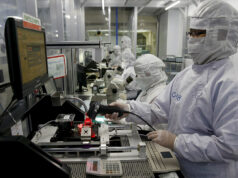Bicam agrees on up to 90% of tax reform bill
THE bicameral conference committee harmonizing Tax Reform for Acceleration and Inclusion (TRAIN) bills from the House and Senate have agreed on “85 to 90%” of the legislation, or about 75 key provisions, Sen. Juan Edgardo M. Angara said.
Mr. Angara, who chairs his chamber’s committee on ways and means, made the announcement in a chance interview. In a separate social media post on Thursday, he added: “It seems that we are close to concluding this landmark measure.”
Mr. Angara also said he expects that Friday, Dec. 8, will be the last bicameral meeting on the tax reform bill.
“Tomorrow, we hope to wrap things up,” Mr. Angara said, adding that the committee still has at least five provisions to tackle and agree on, including the tax rates for “coal, mining, cosmetic procedures, housing, and self-employed and professionals,” which are not included in the House version of the bill.
The legislators also agreed to impose a 6-peso tax per liter for both sugar-sweetened and artificially-sweetened beverages, with a 12-peso tax for beverages using high-fructose corn syrup (HFCS).
Milk and coffee, both ground and 3-in-1 varieties, were excluded, as were 100% juice products, according to Mr. Angara.
“That’s the purpose of the measure, to encourage the consumers to drink healthy drinks,” Mr. Angara said.
In the Senate version, the rate was P4.50 per liter for beverages using caloric and non-caloric sweeteners, and P9 per liter for beverages using HFCS. The House version had a P10 per liter tax on beverages using domestically produced sugar and P20 per liter for other sweeteners.
As for the proposed higher tax rate on cosmetic procedures, Mr. Angara said: “There are many doubts in Congress, and it’s up for a lot of debate. I hope tomorrow (Friday) we can find common ground.”
“The entertainment industry opposes it. Senator (Franklin M.) Drilon feels strongly about (raising the tax) as a matter of principle,” Mr. Angara added.
In an interview on Wednesday, Mr. Drilon said cosmetic procedures should be taxed more as a gesture to those facing higher taxes elsewhere. “We are increasing the excise tax on fuel, which affects everybody. The cost of everyday goods will rise… The poorer segments of society will be affected, so why can we not impose a tax on activities which are purely luxury?”
On the tax rate of self-employed and professionals, Mr. Angara said the two chambers are far apart.
“The House version has a mandatory 8% rate on gross income which falls below the VAT threshold of P3 million.”
In the Senate version, Mr. Angara said an 8% rate is optional for those earning below the VAT threshold, giving them a choice to pay income tax according to the income tax schedule, with deductions.
Mr. Angara said the House wants to totally do away with the excise tax on coal, because of the impact on power prices.
The Senate bill raises the coal excise tax from P10 per metric ton to P100 per metric ton in the first year of implementation, P200 in the second year, and P300 in the third and succeeding years.
Mr. Drilon said: “Many provinces are served solely by coal-fired power plants. The national average would show that 48% of the power source is from coal and bunker fuel. That is the national average. However, there are certain areas where this is not the proportion because there is no renewable source of energy that is sufficient. For example, in the case of Mindanao, the whole of Mindanao is 60% dependent on coal-fired and bunker power plants as source of energy.”
Speaker Pantaleon D. Alvarez meanwhile said he sees no way for the chamber to approve the coal tax.
“We will not agree to that. Definitely not,” Mr. Alvarez said.
“Let us look at this objectively from the point of view of the consumers because the power industry will not complain much — it can pass on the cost to consumers,” he said.
Mr. Angara also announced that members of the bicameral conference committee agreed on Wednesday to increase the tax-exempt portion for 13th month pay and other bonuses to P90,000.
The Senate version of TRAIN had an P82,000 tax-free cap, unchanged from current law, while the House version called for tax-free treatment for up to P100,000. — Arjay L. Balinbin, Minde Nyl R. dela Cruz



